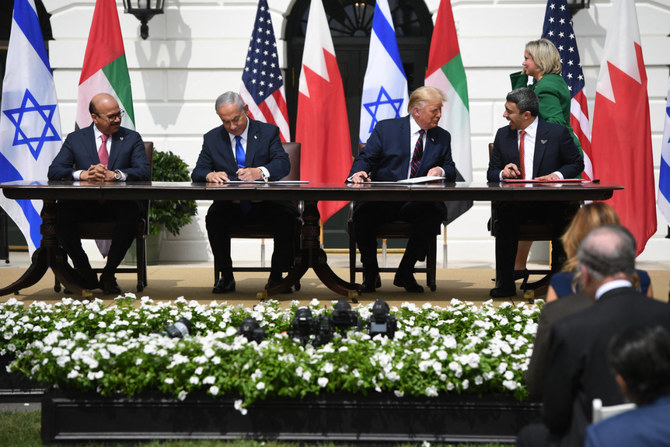LONDON: The majority of Palestinians are opposed to the Abraham Accords, the agreements that normalized diplomatic relations between Israel and some Arab nations in 2020, and that just over a half believe it made Israel more aggressive, a new survey suggested.
The latest Arab News-YouGov poll about the Palestinian situation from the point of view of Palestinians on the 75th anniversary of the Nakba, revealed that 64 percent of the respondents said to be against the accords, with only 10 percent expressing a favorable opinion.
The Abraham Accords, signed in September 2020, are a series of agreements between Israel and four Arab countries — the United Arab Emirates, Bahrain, Sudan, and Morocco — that established formal diplomatic relations, including the exchange of ambassadors and the opening of embassies.
The Accords, mediated by the Trump administration, were hailed as a major breakthrough in Middle East diplomacy.
However, the agreements have been met with widespread opposition from Palestinians, who believe they fail to address the root causes of the conflict.
When asked about the impact of the Accords, 52 percent of those surveyed said that the agreement had made Israel more aggressive towards the Palestinians, while 43 percent said they had seen no impact or change, and only 6 percent said they believed the agreement had made the situation better.
The results of the poll highlight a deep mistrust of Palestinians towards a possible peaceful resolution of the conflict, as they show that the Abraham Accords failed to produce tangible improvements for Palestinians.
This mistrust was foretold by former Saudi intelligence chief Prince Turki al Faisal, who said in an interview with Arab News’ “Frankly Speaking” video show in May last year that there is no evidence that embracing Israel has made it less aggressive towards Palestinians.
Prince Faisal argued that despite some Arab countries having normalized their relationship with Israel, the situation in the West Bank and Gaza remains the same.
“Attacks and assassinations of Palestinian individuals take place almost on a daily basis. The stealing of Palestinian land by Israel continues despite the assurances that Israel gave to the signatories of the peace (accord) between the UAE and Israel,” Prince Faisal said.
“So, there is no sign whatsoever that appeasing Israel is going to change their attitude.”
The poll also revealed the most commonly chosen reasons for the failure of peace talks, unveiling a fragmented, complex picture.
The top reason, chosen by 21 percent of respondents, was “Continued Israeli intimidation, settlements, and annexation.”
This was followed by “US bias towards Israel,” chosen by 15 percent, and “mistakes and lack of leadership of the Palestinian Authority,” chosen as the top reason by 14 percent of people surveyed.
While 11 percent of respondents saw the disputes over Al-Aqsa Mosque and the status of Jerusalem as significant barriers to peace, 32 percent of interviewees believed that Palestinian armed militias sabotaging the peace talks ranked at the bottom of the reasons for failure.
These results suggest that Palestinians see a range of factors contributing to the failure of past peace talks and initiatives, including both internal and external factors. However, only 2 percent of respondents ranked the issue of the “Palestinian state’s ability to carry arms and defend itself” as the top reason for the failure.
Interestingly, the poll also revealed that a significant proportion of respondents — 31 percent — did not choose any of the six options presented, indicating a level of uncertainty or frustration with the peace process.




























